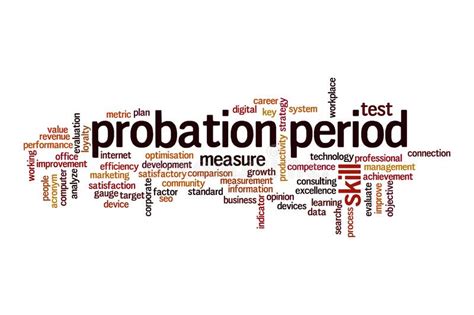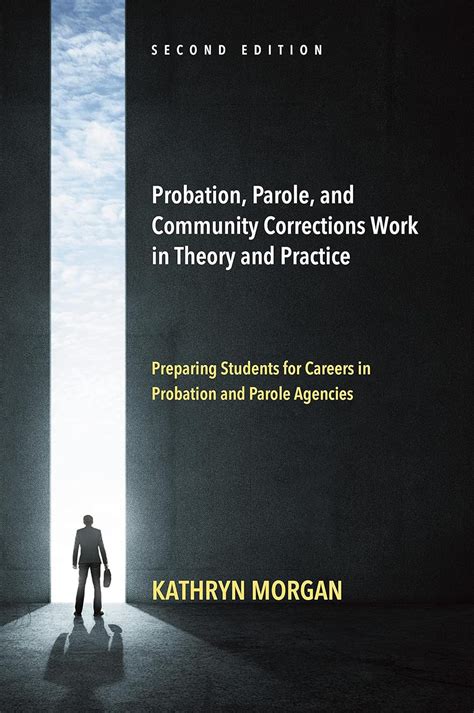Careers In Probation

The field of probation is an integral part of the criminal justice system, offering a unique and rewarding career path for those interested in social work, criminology, and law enforcement. Probation officers play a critical role in rehabilitating offenders and ensuring public safety, making this profession both challenging and impactful. This article delves into the world of probation careers, exploring the roles, responsibilities, and opportunities within this field.
The Role of Probation Officers: A Comprehensive Overview

Probation officers, also known as community corrections officers, are professionals who work with individuals who have been convicted of crimes and are serving sentences outside of prison. Their primary goal is to supervise and guide these individuals, known as probationers, to ensure they comply with the conditions of their probation and reduce the likelihood of reoffending.
Key Responsibilities of Probation Officers
- Pre-Sentence Reports: Probation officers often conduct pre-sentence investigations, gathering information about the offender’s background, criminal history, and personal circumstances. This report is used by judges to make informed sentencing decisions.
- Supervision and Case Management: They are responsible for supervising probationers, which involves regular meetings, home visits, and maintaining close contact to ensure compliance with the terms of probation. This includes drug testing, curfews, community service, and any other specific conditions set by the court.
- Rehabilitation and Support: A crucial aspect of their role is providing guidance and support to probationers. This can involve connecting them with relevant services such as substance abuse treatment, mental health counseling, job training, and educational programs to facilitate their reintegration into society.
- Risk Assessment and Management: Probation officers assess the risk level of each offender and develop strategies to manage these risks. This includes identifying potential triggers for reoffending and implementing interventions to address these risks effectively.
- Court Appearances: They may be required to appear in court to provide updates on a probationer’s progress or to offer recommendations for modifications to the probation conditions.
- Record Keeping and Reporting: Detailed record-keeping is essential, as probation officers must maintain accurate and up-to-date files on each case. This information is vital for reporting to supervisors, courts, and other relevant authorities.
| Key Responsibility | Description |
|---|---|
| Pre-Sentence Investigations | Conducting thorough research and writing reports to aid judges in sentencing. |
| Supervision | Monitoring and guiding probationers to ensure compliance with conditions. |
| Rehabilitation Support | Connecting probationers with services to facilitate successful reintegration. |
| Risk Assessment | Evaluating and managing risks to prevent reoffending. |
| Court Appearances | Providing updates and recommendations to the court on probationer progress. |
| Record Keeping | Maintaining detailed and accurate case files for administrative and reporting purposes. |

Education and Skills Required for a Career in Probation

A career in probation typically requires a bachelor’s degree in fields such as criminal justice, social work, psychology, or a related discipline. Some positions may require a master’s degree, particularly for supervisory roles or specialized areas of practice.
Key Skills and Attributes
- Communication Skills: Excellent verbal and written communication abilities are essential for interacting with probationers, their families, and other professionals.
- Empathy and Interpersonal Skills: The ability to build rapport and establish trust with individuals from diverse backgrounds is crucial.
- Critical Thinking: Probation officers must assess complex situations and make informed decisions.
- Problem-Solving: They often encounter challenging cases and must develop creative solutions to address them.
- Organization and Time Management: Managing multiple cases and meeting deadlines are daily tasks for probation officers.
- Cultural Competence: Understanding and respecting diverse cultural backgrounds is vital for effective supervision and support.
- Stress Management: The role can be emotionally demanding, so the ability to manage stress is essential.
Career Paths and Specializations in Probation
The field of probation offers a range of career paths and specializations, allowing professionals to focus on specific areas of interest and expertise.
General Probation Officer
General probation officers are responsible for supervising a caseload of probationers, ensuring compliance with court-ordered conditions, and providing support for rehabilitation. They work with individuals across various crime types and levels of risk.
Juvenile Probation Officer
Juvenile probation officers specialize in working with young offenders. This role involves understanding the unique needs and challenges of adolescents, and providing guidance and support to help them avoid further involvement with the criminal justice system.
Drug Court Probation Officer
In drug courts, probation officers work closely with offenders who have substance abuse issues. They assist in developing treatment plans, monitoring progress, and providing support to help individuals overcome addiction and rebuild their lives.
Specialized Probation Services
Some probation officers specialize in working with specific populations, such as domestic violence offenders, sex offenders, or individuals with mental health or intellectual disabilities. These specializations require in-depth knowledge and understanding of the unique challenges faced by these groups.
The Impact and Challenges of a Probation Career
A career in probation can be immensely rewarding, as probation officers have the opportunity to make a positive impact on the lives of individuals and communities. By helping probationers successfully complete their sentences and reintegrate into society, they contribute to reducing recidivism rates and promoting public safety.
Challenges in the Field
- High-Stress Environment: The nature of the work can be emotionally and mentally demanding, requiring officers to manage their own well-being while supporting probationers through difficult circumstances.
- Safety Concerns: Working with individuals who have criminal records can present safety risks, requiring officers to be vigilant and well-prepared.
- Caseload Management: Managing a large caseload with varying levels of risk and needs can be challenging, requiring efficient time management and organizational skills.
- Complex Cases: Some cases may involve intricate family dynamics, substance abuse issues, or mental health concerns, requiring specialized knowledge and intervention strategies.
Advancement Opportunities and Career Growth

Probation officers have the opportunity to advance their careers through various paths. With experience and additional education, they can move into supervisory roles, such as senior probation officer or program manager, where they oversee a team of officers and manage probation programs.
Continuing Education and Professional Development
Continuing education is vital in this field to stay updated with the latest research, best practices, and legal developments. Probation officers can pursue advanced degrees, certifications, or specialized training to enhance their skills and knowledge. This can open doors to leadership roles, research positions, or even roles in policy development and advocacy.
What is the typical salary range for probation officers?
+
Salary ranges can vary based on location, experience, and specialization. On average, probation officers can expect to earn between 40,000 and 70,000 annually. However, with additional education and experience, salaries can increase significantly, with some senior positions offering six-figure incomes.
Are there opportunities for remote work in probation careers?
+
While most probation officer roles require in-person supervision and interactions, there may be opportunities for remote work in administrative or specialized roles. For instance, some positions may involve remote record-keeping, data analysis, or providing support to probationers via online platforms.
What are some common challenges faced by probation officers in their daily work?
+
Probation officers often face challenges such as managing high-risk probationers, dealing with complex family situations, and navigating substance abuse or mental health issues. They must also balance the need for supervision with the privacy and autonomy of probationers, which can be a delicate task.
How can probation officers ensure their own safety while working with potentially dangerous individuals?
+
Probation officers receive training in self-defense and conflict resolution. They also work closely with law enforcement and have access to emergency protocols. Additionally, they learn to recognize potential risks and take appropriate precautions to ensure their safety.


